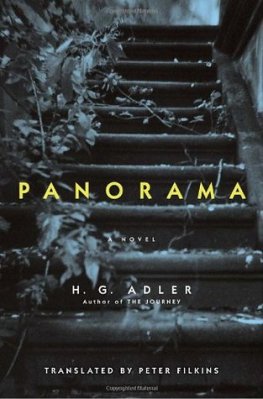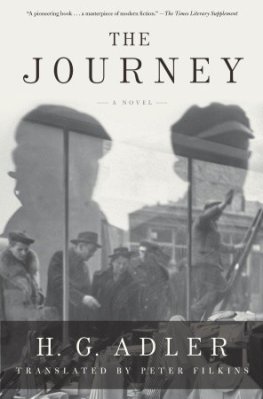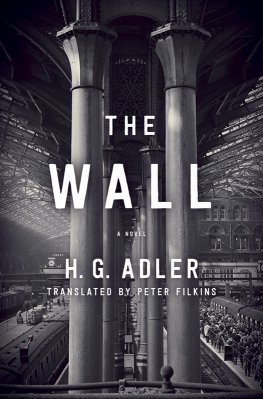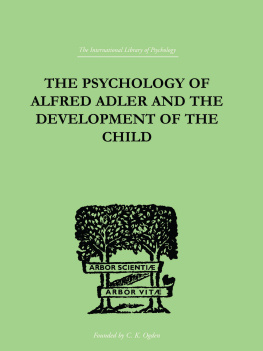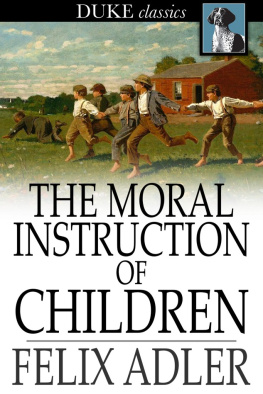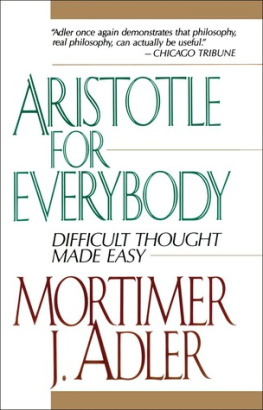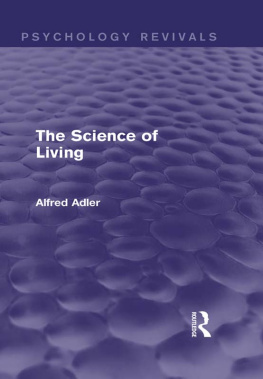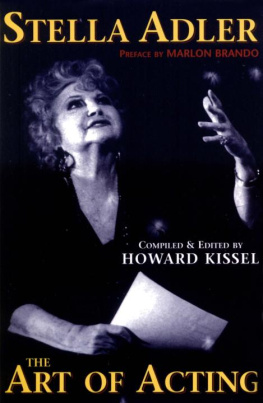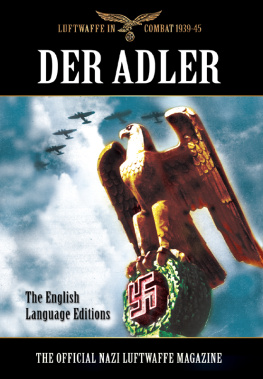
THE GERMAN TEXT FOR THE NOVEL IS TAKEN FROM THE 1968 FIRST EDITION of Panorama published by Walter-Verlag, which was awarded the Charles Veillon Prize the following year.
I am deeply grateful to the American Academy in Berlin for a Berlin Prize Fellowship, which was key to my initial work on Adler while translating his second novel, The Journey, Panorama being his first. Particular thanks goes to my colleague Chris Callanan for his immensely resourceful knowledge of German, and for his willingness to respond to and debate numerous questions on the text. I am also grateful to Jeremy Adler for his many patient replies to questions, to Philip Bohlman for his support and friendship, and to Peter Demetz for granting permission to reprint his excellent afterword. As ever, Susan Roeper has been there throughout, helping me to think through so many choices, while my editor at Random House, Paul Taunton, remains a guiding intelligence to this day.

I still border on a word and on another land,
I border, like little else, on everything more and more,
A Bohemian, a wandering minstrel, who has nothing, who
Is held by nothing, gifted only at seeing, by a doubtful sea, the land of my choice.
INGEBORG BACHMANN
Bohemia Lies by the Sea
WHEN H. G. ADLER RETURNED TO PRAGUE IN JUNE OF 1945, HE CARRIED within him the remains of a time and place that was no more, and that would never exist again. Exhausted, nearly dead from the two months trek back from the Langenstein camp outside Buchenwald, where he had been liberated by American troops in April, Adler returned to Prague by way of Theresienstadt, retrieving from Leo Baeck the voluminous notes he had taken during his two and a half years there. A decade later, these would become his monumental study Theresienstadt 19411945, his first significant publication, earning him the Leo Baeck Prize and early, yet fleeting acclaim. In that same ten-year period, however, Adler also wrote five novels, the first of which, Panorama, was produced in 1948, in the white heat of a survivors fervor, Adler having moved to London and permanent exile the year before.
Panorama is Adlers elegy to a world that was no more. Pastoral, even comic in its rendering of the Prague and the Bohemia in which Adler grew up after World War I, it harks back to the past not out of mere nostalgia but, rather, to show how even amid the innocence of childhood and a world steeped in a history and a tradition that could be traced to the Romans, the seeds of its own destruction were planted, resting invisible and unknown beneath the surface but destined to blossom in the full terror and violence that would wipe out not only a people but also a language and a culture that had produced the likes of Franz Kafka and so much more.
For what is perhaps most important to appreciate about Adler and Panorama is that in many ways it is the culminating product of what is known as the Prague Circle of German letters, a distinct milieu whose writers and audience were primarily German-speaking Jews of the Hapsburg Empire, and who considered themselves citizens of that empire until its dissolution in 1918, their primary identification resting with the ancient kingdom of Bohemia throughout. After that came the formulation of Czechoslovakia, though even then Bohemia remained its largest and most populated region. Hitlers annexation of the Sudetenland in 1938 marked the first time that Bohemias territory had been divided in nearly a thousand years. As we know, this annexation also set off the cataclysm that extinguished not only the writers of the Prague Circle but also their readers, not to mention every trace of the German language from the streets of Kafkas Prague. Born there in 1910, Adler was at the tail end of the generation that could count Kafka as its immediate ancestor and whose literary style had been shaped by him and by the distinct sentence structure and diction that were native to the Prague Circle.
It requires no great leap, then, to see that Josef Kramer, whose life is depicted in Panorama, and whose biography mirrors Adlers, is a clear manifestation of that other Josef K. of certain renown. Indeed, whereas Kafkas object is largely to illuminate the nightmarish unreality of the everyday world that Josef K. finds himself trapped within, Adlers is to create a mirror image of that world, in which he explores the everyday nature of the nightmare that he himself came to experience and to survive. At the start of the novel, the reader has no idea that Josef will end up in the Langenstein camp, or that, like Adler, he will end the book as an exile in England who cannot look forward without looking back. But the unknowable nature of such events is very much to the point, for neither could the young Adler, or the culture that bore him, see it coming. From the first page of The Trial, we know that Josef K. has woken to a world that will probably not allow him to survive. At the start of Panorama, however, we are immersed in the everyday charms of a milieu that, from the point of view of Josef Kramer, looking back through the panorama of his experience and memory, is all the more poignant for its unanticipated, yet inescapable, demise.
The consciousness at work formulating this past is also a key reason that Panorama is neither an autobiographical novel nor a bildungsroman meant to trace a certain kind of development and upbringing. For, indeed, the very conceit of formulating the novel as a panorama by structuring it as ten separate and distinct scenes from Josef Kramers life with no plot development between them is itself an augmentation of the autobiographical mode. Yes, all the principle moments of Josefs life stem from Adlers own, and yes, Adler saw his life as emblematic of the experience of an entire generation. And yet it is how he writes that life which distinguishes the true nature and intent of the book as a novel bent more on capturing a consciousness as it reflects on experience than on depicting that experience in any sort of pedestrian or naturalistic way.
Consider, for instance, the books style the way its long, streaming sentences build clause upon clause in order to render the consciousness at work narrating the novel as much as the events themselves. Here, for instance, is Josef at around the age of eleven, living as a foster child on a farm in Umlowitz, a region and an experience that he loves through and through:
Now Josef is also a herder for Herr Neumann, who owns some pastureland, though most of the cattle graze in Purtschers fields on a side slope of the Haselberg. The cattle in the shed are tied up, and normally Poldi helps Josef release them, since he cant do it alone, it going all right with the goats and with Cappi, but not as well with the other cows, the worst being Liesel, who is a restless animal that requires more patience. Josef holds a big stick that he made himself, though Ottos is much nicer, even if its shorter and not as strong, Fritz being much more gifted at wood carving, for he can carve decorations and letters into the stick, such that it almost looks like something out of a picture from a book about Indians. Josef isnt as good, having cut his finger once while he was carving in the open fields, the finger bleeding for so long that Josef had to wrap his handkerchief around it, while that night Herma made a proper bandage, carefully washing the finger at first and rubbing it with alcohol so that it wouldnt get infected, though it burned like hell, Herma saying that was just what had to be, because there had once been a farm boy in Umlowitz who also cut himself, and no one did anything about the wound, such that the poor boy got a terrible illness called tetanus, and the next day he was dead, since there was nothing that could be done for him. And so Josef held his finger still, not wanting to get any tetanus, and two days later the finger was fine again and hadnt gotten infected.

